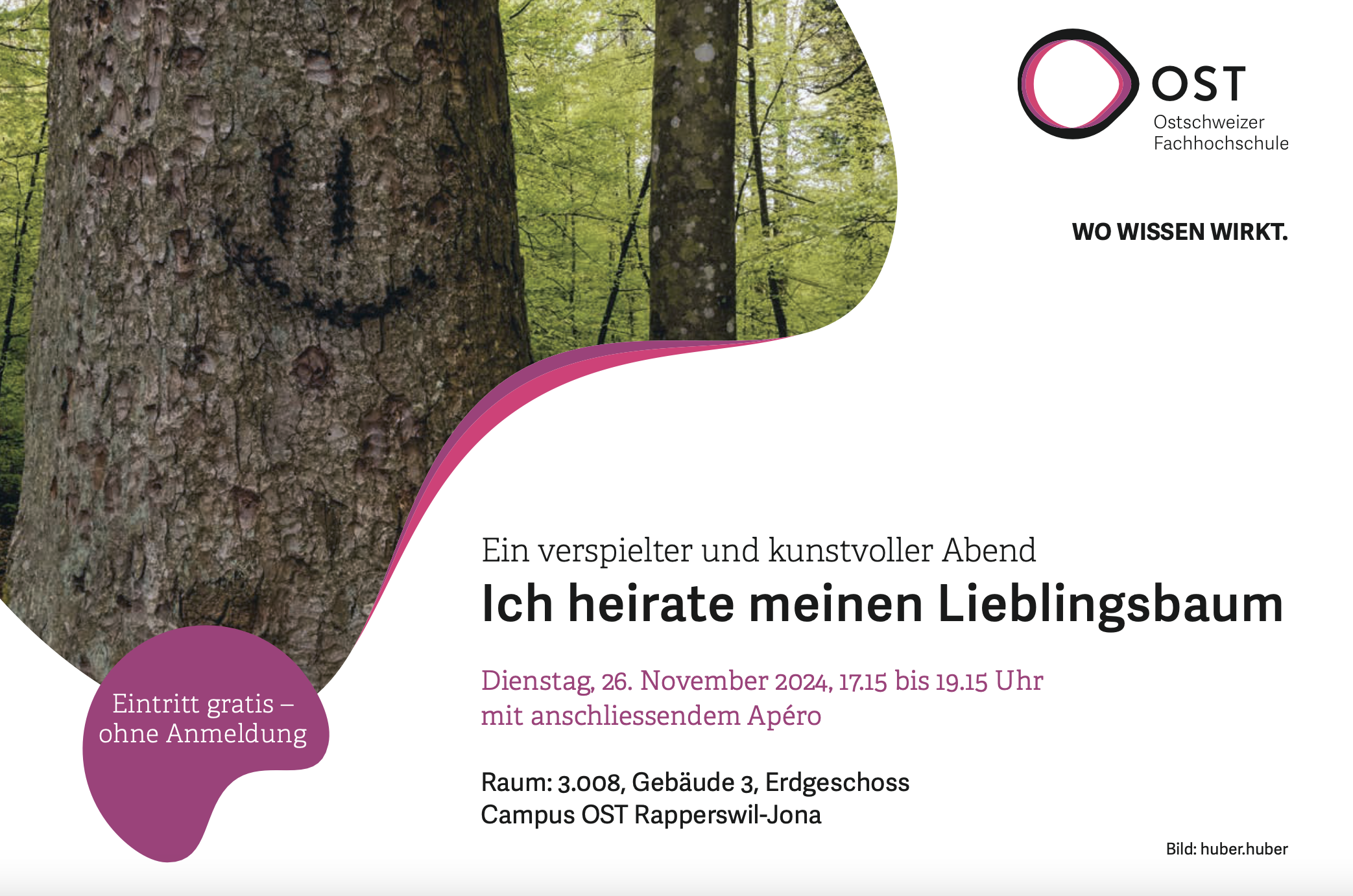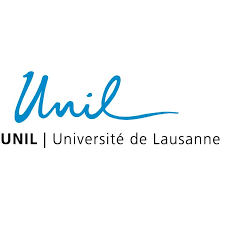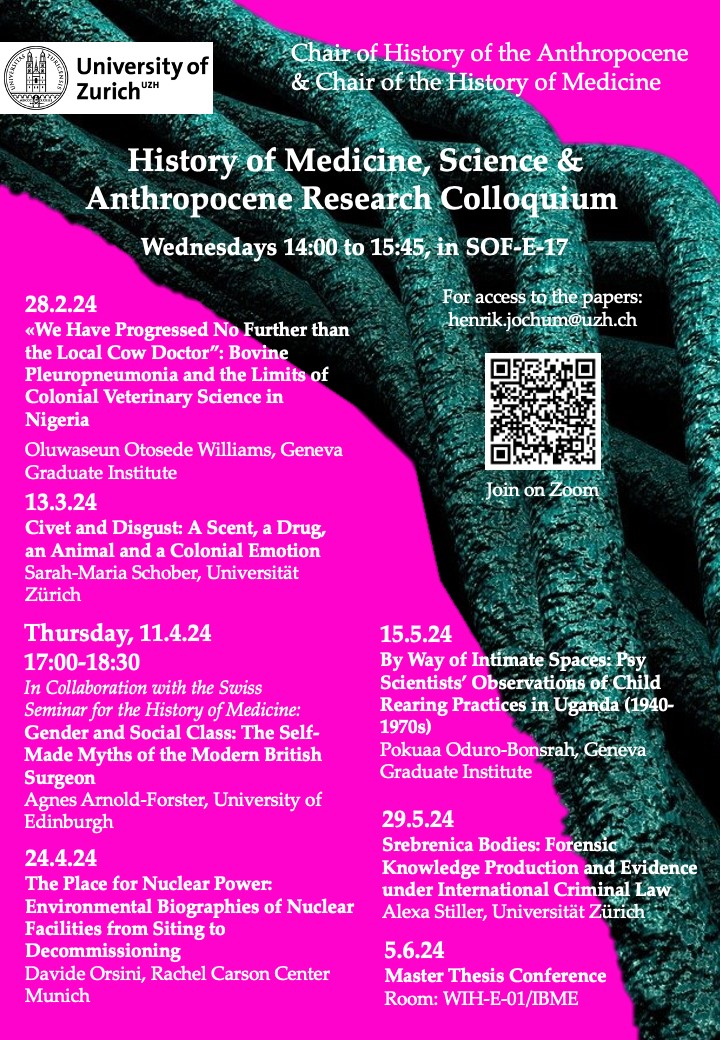Newsticker
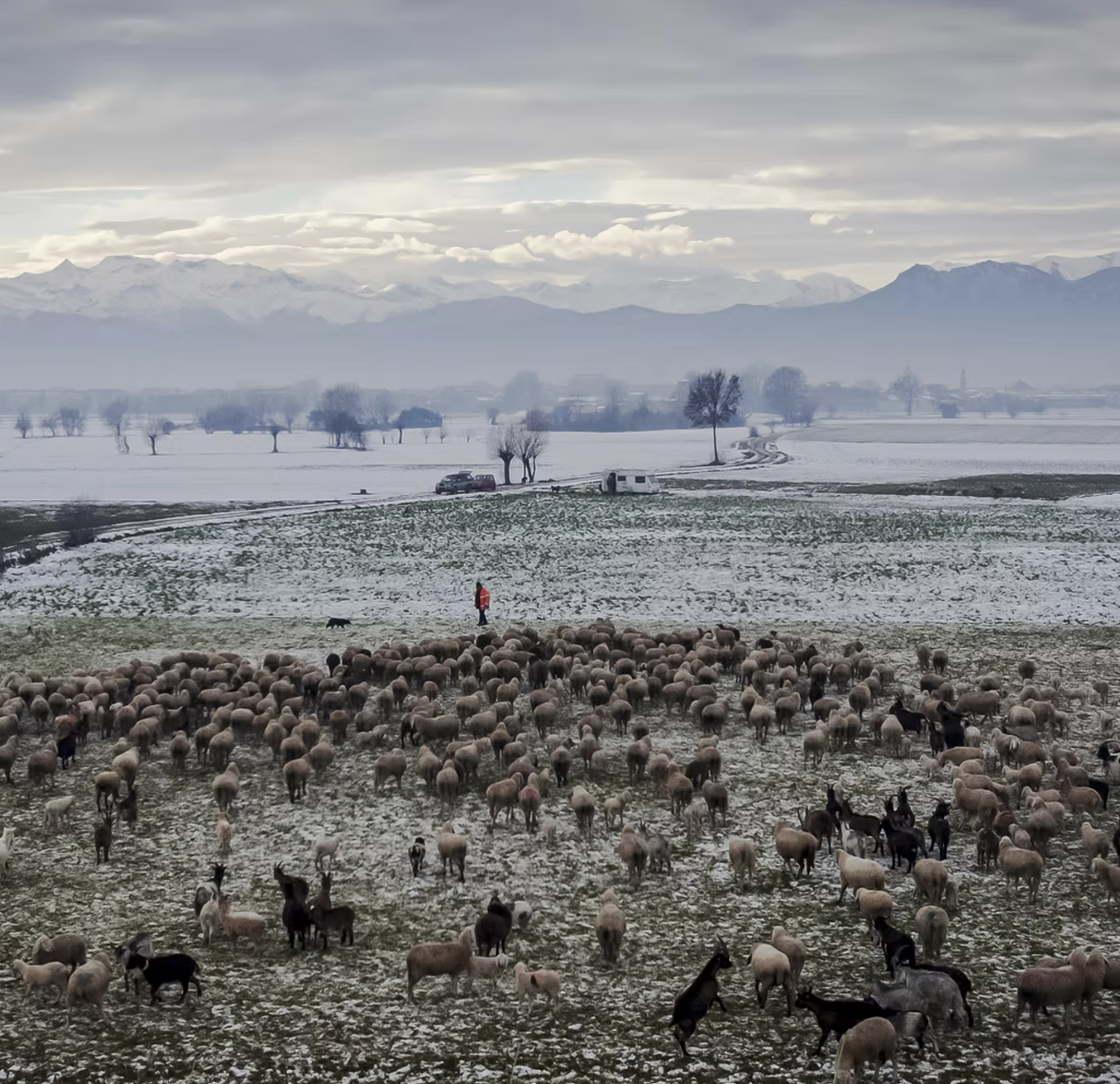
︎ October 24, 2025, 6:30pm
“In an Italy polarized between wolf-defenders and wolf-opponents, a soon-to-be-retired professor finds himself torn between saving sheep and saving their predators…”
Samer Angelone’s debut feature film Lupi Nostri will be screened at Filmpodium Cinema, Zurich, on Thursday, 24 October at 18:30. The film has already gained international recognition, winning Best Film at Australia’s Scinema Science Film Festival.
Lupi Nostri follows Professor Luca Rossi in the final years of his career as he studies wolves in Italy. His scientific work becomes increasingly entangled with personal emotions as he navigates the polarized world of wolf defenders and opponents. The film offers an intimate look at both the animals themselves and the humans whose lives are bound up with them.
All those interested in environmental humanities are warmly encouraged to attend!
📍Filmpodium, Nüschelerstrasse 11, 8001 Zürich
︎ Further Information about the event here
Screening of Lupi Nostri by Samer Angelone
“In an Italy polarized between wolf-defenders and wolf-opponents, a soon-to-be-retired professor finds himself torn between saving sheep and saving their predators…”
Samer Angelone’s debut feature film Lupi Nostri will be screened at Filmpodium Cinema, Zurich, on Thursday, 24 October at 18:30. The film has already gained international recognition, winning Best Film at Australia’s Scinema Science Film Festival.
Lupi Nostri follows Professor Luca Rossi in the final years of his career as he studies wolves in Italy. His scientific work becomes increasingly entangled with personal emotions as he navigates the polarized world of wolf defenders and opponents. The film offers an intimate look at both the animals themselves and the humans whose lives are bound up with them.
All those interested in environmental humanities are warmly encouraged to attend!
📍Filmpodium, Nüschelerstrasse 11, 8001 Zürich
︎ Further Information about the event here

︎ December 15, 2024 - August 18, 2025
The exhibition Naming Natures critically explores the colonial legacy of natural history through the lens of Swiss scientific expeditions in 19th-century Latin America. Co-curated by historian Tomás Bartoletti and artist-researcher Denise Bertschi, the multi-site project brings together historical collections, contemporary art, and scientific research to examine the entanglements of science, empire, and Indigenous knowledge.
At the heart of the exhibition is the work of Swiss naturalist Johann Jakob von Tschudi, whose extensive zoological and archaeological collections from Peru are shown in full for the first time. Naming Natures challenges the traditional Nature/Culture divide and reflects on the role of museums in shaping environmental knowledge, past and present.
The exhibition invites visitors to reconsider Switzerland’s participation in global scientific networks and to engage with Indigenous perspectives as part of a more inclusive environmental discourse.
Funded by the Swiss National Science Foundation (Agora scheme) and supported by ETH Zurich.
📍Natural History Museum of Neuchâtel (MHNN), Rue des Terreaux 14, 2000 Neuchâtel and CAN Centre d’art Neuchâtel, Rue des Moulins 37, CH–2000 Neuchâtel
︎ Further Information about the event here
Exhibition: Naming Natures – Natural History and Colonial Legacy
The exhibition Naming Natures critically explores the colonial legacy of natural history through the lens of Swiss scientific expeditions in 19th-century Latin America. Co-curated by historian Tomás Bartoletti and artist-researcher Denise Bertschi, the multi-site project brings together historical collections, contemporary art, and scientific research to examine the entanglements of science, empire, and Indigenous knowledge.
At the heart of the exhibition is the work of Swiss naturalist Johann Jakob von Tschudi, whose extensive zoological and archaeological collections from Peru are shown in full for the first time. Naming Natures challenges the traditional Nature/Culture divide and reflects on the role of museums in shaping environmental knowledge, past and present.
The exhibition invites visitors to reconsider Switzerland’s participation in global scientific networks and to engage with Indigenous perspectives as part of a more inclusive environmental discourse.
Funded by the Swiss National Science Foundation (Agora scheme) and supported by ETH Zurich.
📍Natural History Museum of Neuchâtel (MHNN), Rue des Terreaux 14, 2000 Neuchâtel and CAN Centre d’art Neuchâtel, Rue des Moulins 37, CH–2000 Neuchâtel
︎ Further Information about the event here

︎ July 2-4, 2025
From 2–4 July 2025, ETH Zurich will host the international conference More than Capitalism: Ecologies of Extraction and Production, organized by Dr. Tomás Bartoletti (ETH Zurich, SNSF-Ambizione Fellow).
The conference brings together scholars from around the world to explore multispecies and ecological dimensions of capitalism, with panels addressing topics such as plantation economies, animal labor, biotic borders, and the entanglements of human and non-human actors in extractive histories.
📍ETH main building, HG F3, Rämistrasse 101, 8006 Zurich.
︎ Further Information about the event here
Conference: More than Capitalism - Ecologies of Extraction and Production
From 2–4 July 2025, ETH Zurich will host the international conference More than Capitalism: Ecologies of Extraction and Production, organized by Dr. Tomás Bartoletti (ETH Zurich, SNSF-Ambizione Fellow).
The conference brings together scholars from around the world to explore multispecies and ecological dimensions of capitalism, with panels addressing topics such as plantation economies, animal labor, biotic borders, and the entanglements of human and non-human actors in extractive histories.
📍ETH main building, HG F3, Rämistrasse 101, 8006 Zurich.
︎ Further Information about the event here

︎ May 5, 2025, 6:15 - 7:30pm
Many of us—and certainly many scientists—were raised to believe that facts speak for themselves. “Facts are facts,” it is often said. This belief typically leads scientists to assume that “the truth will out” one way or another. As a result, many believe it suffices to do science—understood as work conducted within the scientific community and published in peer-reviewed journals. In principle, interested parties can seek out this information, but disseminating scientific knowledge to the public is not traditionally seen as a scientist’s responsibility.
Historians, philosophers, and sociologists of science—including, famously, Ludwik Fleck—have long pointed out how much effort is required to establish a “fact,” even within an expert community. Moreover, significant challenges arise when facts move from the expert community where they originated into the public sphere.
In this context, we must acknowledge that facts do not speak for themselves; someone must always speak for them. Given this reality, scientific communities and their allies must find effective ways to communicate facts, recognizing that because facts do not inherently speak for themselves, science communication must be taken more seriously.
Naomi Oreskes is Henry Charles Lea Professor of the History of Science at Harvard University. A world-renowned earth scientist, historian, and public speaker, she is the author of several best-selling books, e.g., Merchants of Doubt (2010) and Why Trust Science? (2019), and a leading voice on the role of science in society. Her new book, with Erik Conway, is The Big Myth: How American Business Taught Us to Loathe Government and Love the Free Market (2023).
📍ETH main building, HG E3, Rämistrasse 101, 8006 Zurich.
︎ Further Information about the event here
Ludwik Fleck Lecture 2025 by Naomi Oreskes: Why Facts Don’t Speak for Themselves
Many of us—and certainly many scientists—were raised to believe that facts speak for themselves. “Facts are facts,” it is often said. This belief typically leads scientists to assume that “the truth will out” one way or another. As a result, many believe it suffices to do science—understood as work conducted within the scientific community and published in peer-reviewed journals. In principle, interested parties can seek out this information, but disseminating scientific knowledge to the public is not traditionally seen as a scientist’s responsibility.
Historians, philosophers, and sociologists of science—including, famously, Ludwik Fleck—have long pointed out how much effort is required to establish a “fact,” even within an expert community. Moreover, significant challenges arise when facts move from the expert community where they originated into the public sphere.
In this context, we must acknowledge that facts do not speak for themselves; someone must always speak for them. Given this reality, scientific communities and their allies must find effective ways to communicate facts, recognizing that because facts do not inherently speak for themselves, science communication must be taken more seriously.
Naomi Oreskes is Henry Charles Lea Professor of the History of Science at Harvard University. A world-renowned earth scientist, historian, and public speaker, she is the author of several best-selling books, e.g., Merchants of Doubt (2010) and Why Trust Science? (2019), and a leading voice on the role of science in society. Her new book, with Erik Conway, is The Big Myth: How American Business Taught Us to Loathe Government and Love the Free Market (2023).
📍ETH main building, HG E3, Rämistrasse 101, 8006 Zurich.
︎ Further Information about the event here

︎ February 25, 2025, 4:15pm
Public online lecture with Tao Leigh Goffe: Dark Laboratory
The faculty of Italian Culture and Society at UNISG is pleased to announce a public guest lecture with Tao Leigh Goffe.
Prof. Tao Leigh Goffe will discuss her recently published book, Dark Laboratory: On Columbus, the Caribbean, and the Origins of the Climate Crisis (Doubleday 2025). Using the Caribbean as a case study, Dark Laboratory traces the vibrant and complex history of the islands back to 1492 and the arrival of Christopher Columbus, when the Caribbean became subject of Western exploitation. Dark Laboratory takes hopeful and galvanising teachings from the islands communities to offer solutions to the ecological crisis.
Dr. Tao Leigh Goffe is an associate professor of literary theory and cultural history with a focus on the environmental humanities and geology. She joins the Department of Africana, Puerto Rican and Latino Studies at Hunter College, City University of New York after over a decade of research and teaching on Black feminist engagements with Indigeneity and Asian diasporic racial formations. This work is the basis of the Dark Laboratory, which she founded and leads as the Executive Director. Established for the study of Black and Indigenous ecologies, Dark Lab is housed at Hunter College and has been supported by the New Museum’s incubator for art and technology.
︎ More information here and registration here
Public online lecture with Tao Leigh Goffe: Dark Laboratory
The faculty of Italian Culture and Society at UNISG is pleased to announce a public guest lecture with Tao Leigh Goffe.
Prof. Tao Leigh Goffe will discuss her recently published book, Dark Laboratory: On Columbus, the Caribbean, and the Origins of the Climate Crisis (Doubleday 2025). Using the Caribbean as a case study, Dark Laboratory traces the vibrant and complex history of the islands back to 1492 and the arrival of Christopher Columbus, when the Caribbean became subject of Western exploitation. Dark Laboratory takes hopeful and galvanising teachings from the islands communities to offer solutions to the ecological crisis.
Dr. Tao Leigh Goffe is an associate professor of literary theory and cultural history with a focus on the environmental humanities and geology. She joins the Department of Africana, Puerto Rican and Latino Studies at Hunter College, City University of New York after over a decade of research and teaching on Black feminist engagements with Indigeneity and Asian diasporic racial formations. This work is the basis of the Dark Laboratory, which she founded and leads as the Executive Director. Established for the study of Black and Indigenous ecologies, Dark Lab is housed at Hunter College and has been supported by the New Museum’s incubator for art and technology.
︎ More information here and registration here
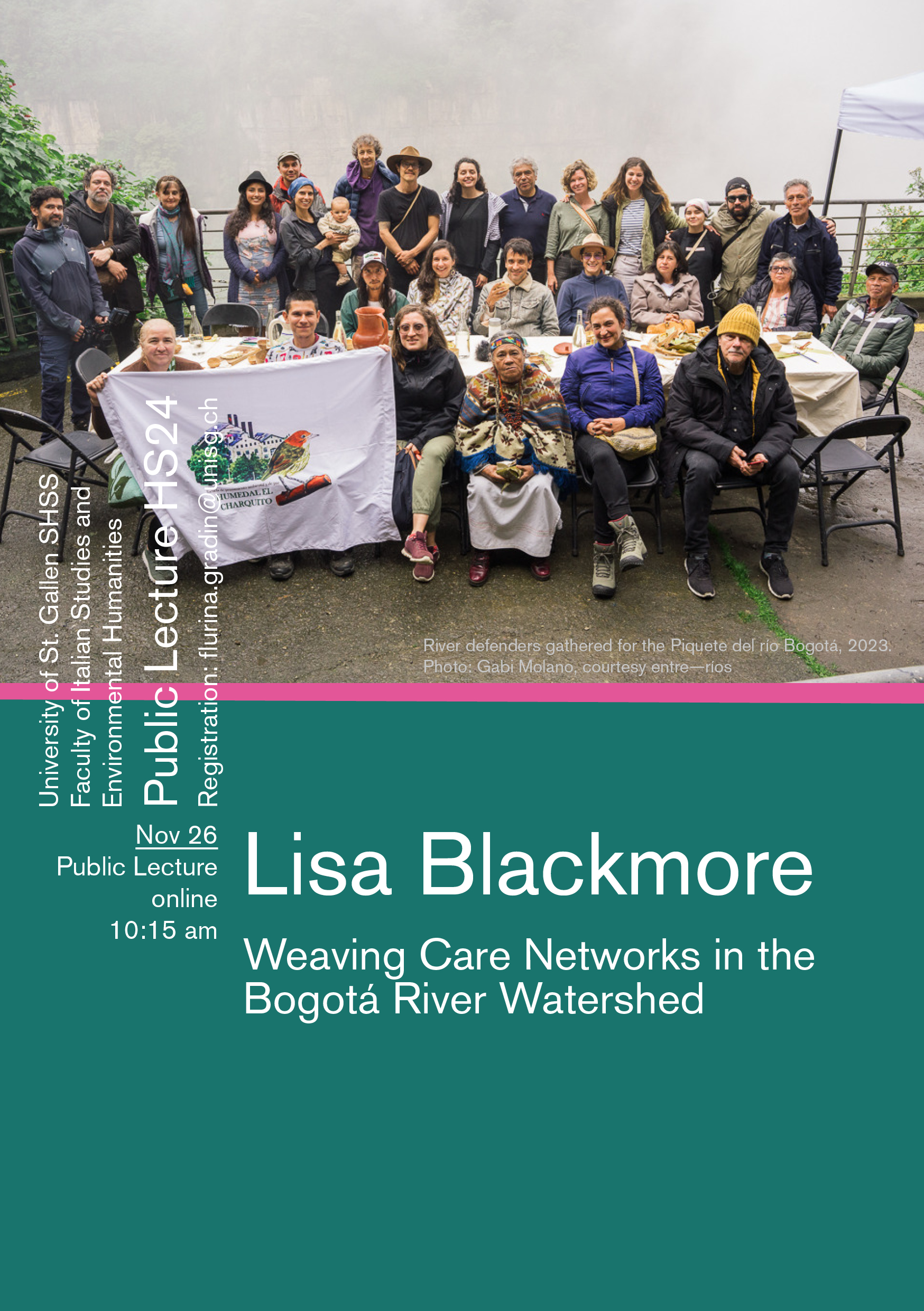
︎ November 26, 2024, 10:15am
Public online lecture with Lisa Blackmore: Weaving Care Networks in the Bogotà River Watershed
The faculty of Italian Culture and Society at UNISG is pleased to announce a public guest lecture with Lisa Blackmore.
In this talk, Lisa Blackmore will address these questions through the Bogotá River, tracing the forces that have transformed the river over the past five hundred years, discussing the impact of ecological imperialism on the Indigenous Mhuysca's amphibious agriculture and of modern urbanization and industrialization. She will present her curatorial work through entre—ríos (https://entre-rios.net/rio-bogota/), where since 2023 the group have sought to weave a network of river caretakers and disseminate their work to wider audiences. As a curatorial response to this protracted ecological crisis, Lisa considers how culinary gatherings and art-science workshops can support the cultivation of water cultures that foster healthier metabolic relations.
Lisa Blackmore is Senior Lecturer in Art History and Interdisciplinary Studies at the University of Essex. She is the founder-director of entre—ríos, a confluence of arts-led projects explores continuities between bodies of water, human bodies, and territories, recognizing rivers as active subjects that produce aesthetic forms, transform landscapes and shape memory. For the past five years, entre—ríos has developed research, curating, editorial work and pedagogical projects across Latin America, including an ongoing participatory research project with the Bogota River in Colombia.
︎ More information here and registration here
Public online lecture with Lisa Blackmore: Weaving Care Networks in the Bogotà River Watershed
The faculty of Italian Culture and Society at UNISG is pleased to announce a public guest lecture with Lisa Blackmore.
In this talk, Lisa Blackmore will address these questions through the Bogotá River, tracing the forces that have transformed the river over the past five hundred years, discussing the impact of ecological imperialism on the Indigenous Mhuysca's amphibious agriculture and of modern urbanization and industrialization. She will present her curatorial work through entre—ríos (https://entre-rios.net/rio-bogota/), where since 2023 the group have sought to weave a network of river caretakers and disseminate their work to wider audiences. As a curatorial response to this protracted ecological crisis, Lisa considers how culinary gatherings and art-science workshops can support the cultivation of water cultures that foster healthier metabolic relations.
Lisa Blackmore is Senior Lecturer in Art History and Interdisciplinary Studies at the University of Essex. She is the founder-director of entre—ríos, a confluence of arts-led projects explores continuities between bodies of water, human bodies, and territories, recognizing rivers as active subjects that produce aesthetic forms, transform landscapes and shape memory. For the past five years, entre—ríos has developed research, curating, editorial work and pedagogical projects across Latin America, including an ongoing participatory research project with the Bogota River in Colombia.
︎ More information here and registration here
︎ November 26, 2024, 5:15 - 7:15pm
A playful and artistic evening focusing on these questions: What relationships do we want to have with nature? What value do our animal and plant fellow creatures have?
We approach these questions through the playful and critical lens of art as well as on the basis of binding rules of jurisprudence. The artist duo huber.huber and the curators Céline Gaillard and Simone Kobler of the exhibition “Denn in den Wäldern sind Dinge...” at the Kunst(Zeug)Haus Rapperswil-Jona will provide an inspiring introduction to the evening. Afterwards, we invite you to a joint experiment: Would you marry a tree on the Rapperswil campus?
📍Campus OST Rapperswil-Jona, Raum 3.008, Gebäude 3, Erdgeschoss
︎ Further Information about the event here
I am marrying my favorite tree
A playful and artistic evening focusing on these questions: What relationships do we want to have with nature? What value do our animal and plant fellow creatures have?
We approach these questions through the playful and critical lens of art as well as on the basis of binding rules of jurisprudence. The artist duo huber.huber and the curators Céline Gaillard and Simone Kobler of the exhibition “Denn in den Wäldern sind Dinge...” at the Kunst(Zeug)Haus Rapperswil-Jona will provide an inspiring introduction to the evening. Afterwards, we invite you to a joint experiment: Would you marry a tree on the Rapperswil campus?
📍Campus OST Rapperswil-Jona, Raum 3.008, Gebäude 3, Erdgeschoss
︎ Further Information about the event here
︎ November 22, 2024
The saguf Annual Conference 2024 will focus on innovation for sustainability transformation. The aim of the conference is to shed light on the diverse and sometimes divergent dynamics of innovation and transformation in discourses and public policy, especially in research policy.
The conference will address practical questions such as what is transformative innovation and what distinguishes it from sustainable innovation? How do the repeated calls and incentives for transformative innovation affect its implementation in practice? What constitutes 'successful' transformative innovation, beyond its upscaling or impact on the regime? And how can the understanding of policy makers, innovators and researchers of transformative innovation be brought together to address pressing global challenges?
📍Kulturpark Zürich (Grosser Saal), Pfingstweidstr. 16, Zürich
︎ Further Information about the event here
︎ Registration here (open until November 18)
saguf annual conference 2024: Innovation in transformation
The saguf Annual Conference 2024 will focus on innovation for sustainability transformation. The aim of the conference is to shed light on the diverse and sometimes divergent dynamics of innovation and transformation in discourses and public policy, especially in research policy.
The conference will address practical questions such as what is transformative innovation and what distinguishes it from sustainable innovation? How do the repeated calls and incentives for transformative innovation affect its implementation in practice? What constitutes 'successful' transformative innovation, beyond its upscaling or impact on the regime? And how can the understanding of policy makers, innovators and researchers of transformative innovation be brought together to address pressing global challenges?
📍Kulturpark Zürich (Grosser Saal), Pfingstweidstr. 16, Zürich
︎ Further Information about the event here
︎ Registration here (open until November 18)
︎ November 07-10, 2024
Since 2017, the Global Science Film Festival has served as a unique bridge between science and society, driven by the creativity of researchers and filmmakers who seek to explore, understand an interpret the world in all its complexity.
With the theme “the shortest distance between science and society is cinema" the festival organizers announced the program of the 6th Global Science Film Festival. The hard selection work ended with selecting 11 full-length films and 12 short films produced by Swiss PhD students from nine universities and research institutes.
Don’t miss out! Saturday evening’s Festival Party and Sunday afternoon’s award ceremony are perfect opportunities to connect and celebrate. For even more, join us for a special film screening on Friday evening in Lugano—and be sure to invite your friends from Ticino!
︎ Further Information about the event here
6th GLOBAL SCIENCE FILM FESTIVAL
Since 2017, the Global Science Film Festival has served as a unique bridge between science and society, driven by the creativity of researchers and filmmakers who seek to explore, understand an interpret the world in all its complexity.
With the theme “the shortest distance between science and society is cinema" the festival organizers announced the program of the 6th Global Science Film Festival. The hard selection work ended with selecting 11 full-length films and 12 short films produced by Swiss PhD students from nine universities and research institutes.
Don’t miss out! Saturday evening’s Festival Party and Sunday afternoon’s award ceremony are perfect opportunities to connect and celebrate. For even more, join us for a special film screening on Friday evening in Lugano—and be sure to invite your friends from Ticino!
︎ Further Information about the event here
︎ October 18, 2024 (posted) | December 20, 2024 (application deadline)
Career Opportunity: Assistant Professor (tenure track) in Environmental Humanities
The Faculty of Geosciences and the Environment (FGSE) of the University of Lausanne invites applications for a professorship in Environmental Humanities - Social Sciences, to be based in the Institute of Geography and Sustainability (IGD).
The candidate will contribute to ongoing debates in environmental humanities at the international level and will pursue a field-based empirical research agenda. The ability to critically, reflexively, and analytically engage with environmental and sustainability issues, and to employ innovative research methods (e.g., multi-sited, multi-species, and multisensory ethnographies; art-based approaches; more-than-human methodologies), is essential. A focus on food studies would be considered an asset. Other research specialisations that align with ongoing work at IGD, such as (urban) commons, (urban) political ecology, agroecology or critical plant studies, are also welcome.
Application deadline: 20th December 2024 (23:59 Swiss time GMT+1).
︎ Further Information about the event here
Career Opportunity: Assistant Professor (tenure track) in Environmental Humanities
The Faculty of Geosciences and the Environment (FGSE) of the University of Lausanne invites applications for a professorship in Environmental Humanities - Social Sciences, to be based in the Institute of Geography and Sustainability (IGD).
The candidate will contribute to ongoing debates in environmental humanities at the international level and will pursue a field-based empirical research agenda. The ability to critically, reflexively, and analytically engage with environmental and sustainability issues, and to employ innovative research methods (e.g., multi-sited, multi-species, and multisensory ethnographies; art-based approaches; more-than-human methodologies), is essential. A focus on food studies would be considered an asset. Other research specialisations that align with ongoing work at IGD, such as (urban) commons, (urban) political ecology, agroecology or critical plant studies, are also welcome.
Application deadline: 20th December 2024 (23:59 Swiss time GMT+1).
︎ Further Information about the event here
📅 Datum der Konferenz: Montag, 09.09.2024 - Mittwoch, 11.09.2024
📅 Date of the conference: Monday, 09.09.2024 - Wednesday, 11.09.2024
🗓️ Frist für das Einreichen von Artikeln: Montag, 01.04.2024
🗓️ Deadline of the call for papers: Monday, 01.04.2024
📍 Ort: Universität Zürich (UZH)
📍 Location: University of Zurich (UZH)
︎ September 09-11, 2024
The conference on interdisciplinary perspectives on landscapes in language, society and cognition ( ILANSCO) adressses the following research questions:
The event organizers are happy to receive abstracts and visitors from the environmental humanities. The call for papers will be open until April 1st.
︎ Further Information about the event and the call for papers here
Interdisciplinary Perspectives on Landscapes in Language, Society and Cognition
The conference on interdisciplinary perspectives on landscapes in language, society and cognition ( ILANSCO) adressses the following research questions:
- How do people from diverse backgrounds think, talk about and interact with landscapes?
- In what ways does linguistic structure influence and/or reflect conceptualisations of landscapes? (relativist vs. universalist perspective)
- How do societal dynamics (e.g. migration) affect the way in which people relate to landscapes?
- What role do political and ideological attitudes play in landscape conceptualisations?
- What are possible implications for sustainable landscape management?
The event organizers are happy to receive abstracts and visitors from the environmental humanities. The call for papers will be open until April 1st.
︎ Further Information about the event and the call for papers here
︎ July 31, 2024 (call for proposals) | November 01, 2024 (decision deadline)
Emerging Scholars Competition in Environmental Humanities – Win a Gold Open Access contract for your book
The academic publisher Peter Lang offers an unparalleled opportunity for emerging scholars to win a Gold Open Access contract for their book. They welcome proposals on the following topics from a humanities or social sciences perspective:
To take part in the competition, you should submit your proposal by 31 July 2024. The decision will be made by 1 November 2024.
For more information or to submit your proposal, contact editorial@peterlang.com or visit their website: https://www.peterlang.com/emerging-scholars-competition/
Emerging Scholars Competition in Environmental Humanities – Win a Gold Open Access contract for your book
The academic publisher Peter Lang offers an unparalleled opportunity for emerging scholars to win a Gold Open Access contract for their book. They welcome proposals on the following topics from a humanities or social sciences perspective:
- Environmental justice
- Environmental education
- Animal rights
- Climate change
- Sustainability
- History of the environment
- Plants and animals
- Society and the environment
- Indigenous knowledge and the environment
- The wilderness
To take part in the competition, you should submit your proposal by 31 July 2024. The decision will be made by 1 November 2024.
For more information or to submit your proposal, contact editorial@peterlang.com or visit their website: https://www.peterlang.com/emerging-scholars-competition/
︎ May 23-24, 2024
Finance and its Environments: New Approaches to Capital
This conference asks 3 critical questions that emerge from our current moment when reconciling the challenges coming out of climate crisis with forms of economic growth at the national and international scale pose a contradiction:
︎ Further Information about the event here
︎ Registration for access to papers here (registration must happen before May 1st)
Finance and its Environments: New Approaches to Capital
This conference asks 3 critical questions that emerge from our current moment when reconciling the challenges coming out of climate crisis with forms of economic growth at the national and international scale pose a contradiction:
- How is the climate crisis itself shaping the emergence of new financial instruments and in what ways does this follow the evolution of the political economy of financial forms from the nineteenth century?
- How does the increasing financialization of nature cast new light on older questions on natural resource frontiers, agrarian life worlds, environmental risk, climate hazard, science and technology
- How can an explicitly interdisciplinary approach broaden how we understand “environment” as a field of social negotiations and structural dynamics between global cores and peripheries even as these are being re-made in our current context?
︎ Further Information about the event here
︎ Registration for access to papers here (registration must happen before May 1st)
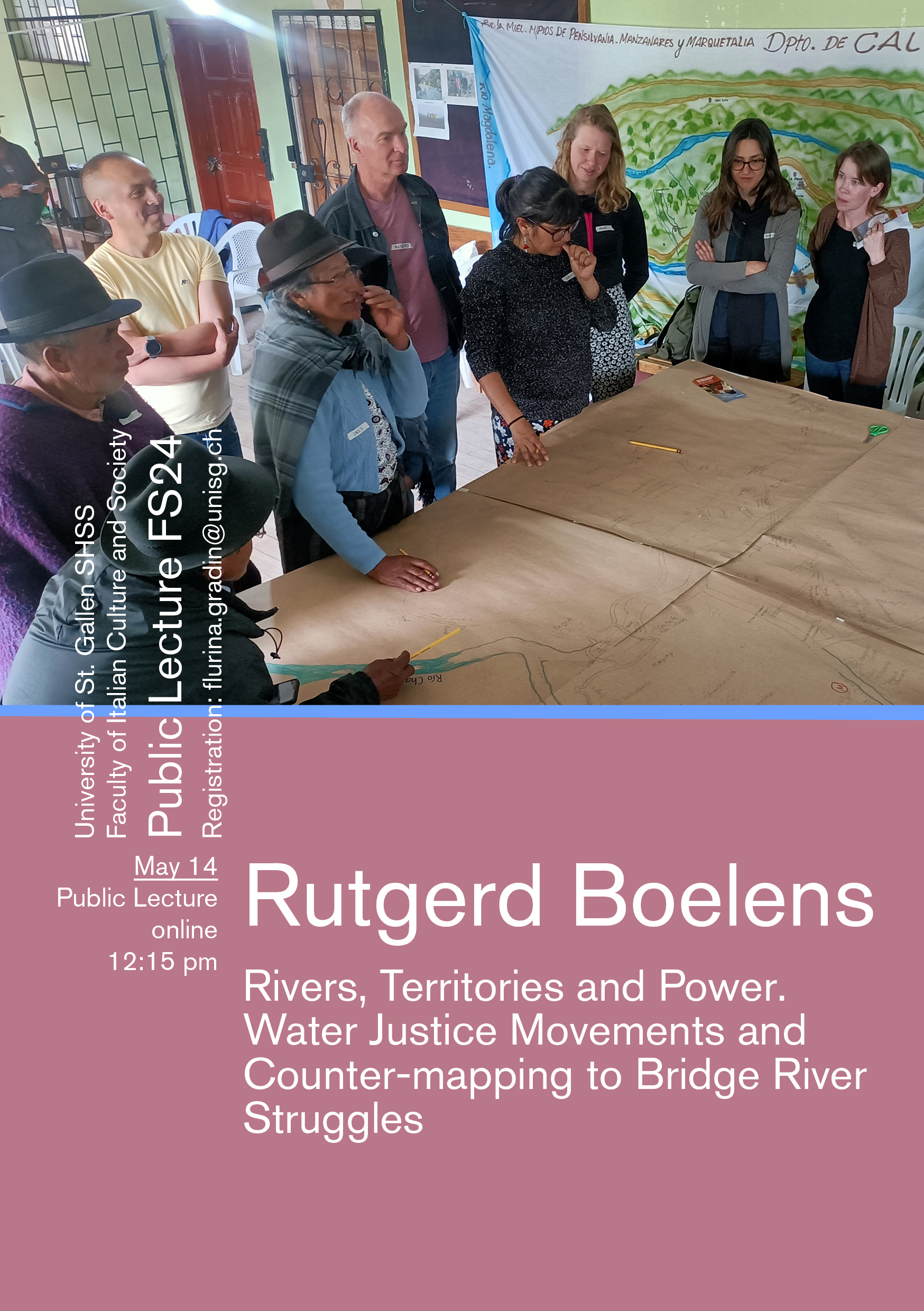
︎ May 14, 2024
Public online lecture with Rutgerd Boelens: Rivers, Territories and Power. Water Justice Movements and Counter-mapping to Bridge River Struggles
The faculty of Italian Culture and Society at UNISG is pleased to announce a public guest lecture with Rutgerd Boelens. The event is part of the public activities of the Political Ecologies Network at the University of St. Gallen. Everyone interested is warmly invited to join.
Maan Barua "Rivers, Territories and Power. Water Justice Movements and Counter-mapping to Bridge River Struggles" on May 14th, 12:15 pm CEST.
︎ More information here and registration here
Public online lecture with Rutgerd Boelens: Rivers, Territories and Power. Water Justice Movements and Counter-mapping to Bridge River Struggles
The faculty of Italian Culture and Society at UNISG is pleased to announce a public guest lecture with Rutgerd Boelens. The event is part of the public activities of the Political Ecologies Network at the University of St. Gallen. Everyone interested is warmly invited to join.
Maan Barua "Rivers, Territories and Power. Water Justice Movements and Counter-mapping to Bridge River Struggles" on May 14th, 12:15 pm CEST.
︎ More information here and registration here
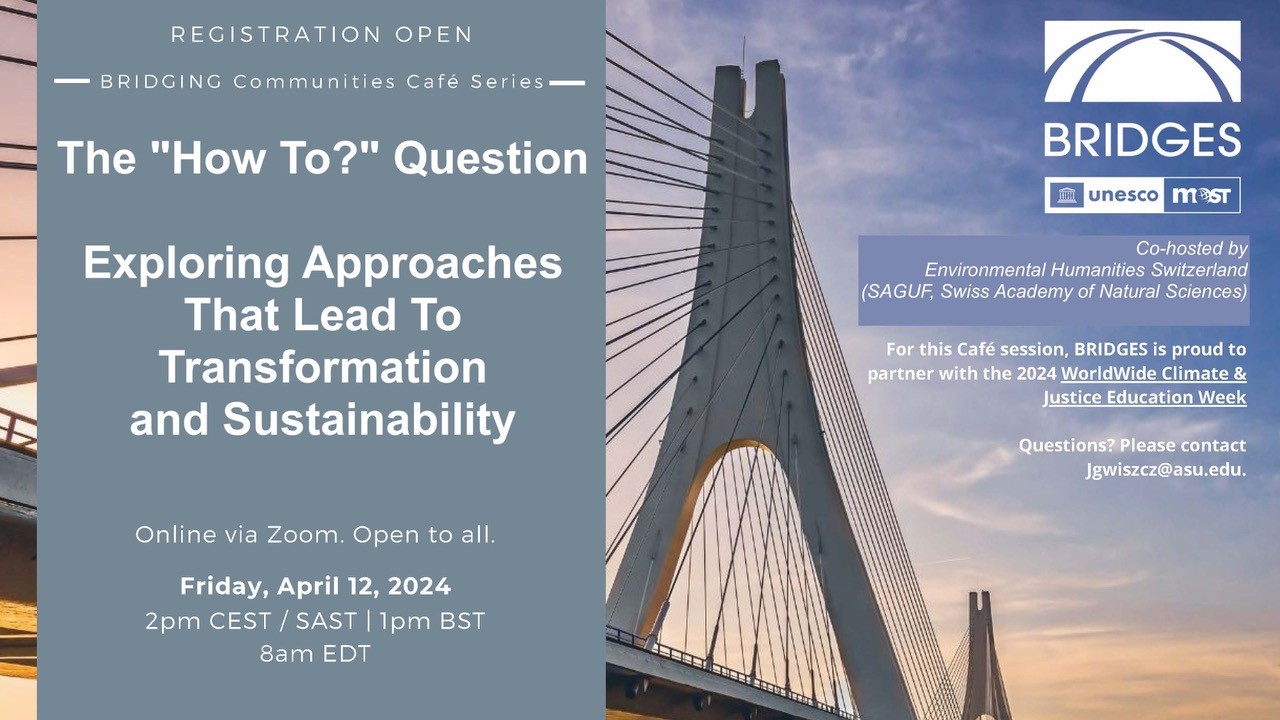
︎ April 12, 2024
Visit this Café session open to all online via Zoom on Friday, April 12, 2024 on 14:00 o’clock.
Contact for further questions here
Exploring Approaches that lead to Transformation and Sustainability
Visit this Café session open to all online via Zoom on Friday, April 12, 2024 on 14:00 o’clock.
Contact for further questions here

📅 Datum der Vorlesung: Samstag, 06.04.2024
📅 Date of the lecture: Saturday, 06.04.2024
💬Sprache: Englisch
💬Language: English
💵 Kosten:
Eintritt mit Apéro und Abendessen: CHF 120
Mit zusätzlicher Übernachtung: CHF 180
💵 Cost:
Admission with aperitif and dinner: CHF 120
With additional overnight stay: CHF 180
📍 Ort: Hotel Hammer, Würzenrain 11, 6013 Eigenthal
📍 Location: Hotel Hammer, Würzenrain 11, 6013 Eigenthal
🚌 Mögliche Anreise: öV via PostAuto Nr. 71 von Luzern
🚌 Possible arrival: Public transport via PostBus No. 71 from Lucerne
︎ April 06, 2024
ANIMISM - The
Necessity Of Recovering An Ancestral Paradigm In A Soulless World
In this lecture including questions from the audience Dr. Luna will present his own experience with Amazonian practitioners, and their use of sacred plants. He will also refer to contemporary studies of plant and animal intelligence by evolutionary ecologists.
Since the 17th century, there has been a gradual process of reducing the realm of mind first into the bodies of human beings, especially those of the “civilized men”, and then solely into their “awaken” brains, disregarding the dream time.
A strict separation between culture and nature has been accepted as a given fact, the supposed intelligence of the world - animals, plants, fungi, microorganisms, and abiotic phenomena - relegated to the superstition of traditional societies.
The results of this disenchanted worldview has been the reckless destruction of ecosystems, the extinction of countless organisms, and above all, a feeling of separation, loneliness, loss of meaning and lack of solidarity with the world at large.
Dr. Luna has lectured worldwide on indigenous and mestizo shamanism and has been a curator of visionary art exhibits in Europe, Latin America, the United States, and Japan. He is the Director of Wasiwaska, Research Center for the Study of Psychointegrator Plants, Visionary Art and Consciousness, Florianópolis, Brazil (www.wasiwaska.org). Since June 2022 he is also an Honorary Research Fellow of University of Exeter, England.
︎Registration here (limited number of places).
ANIMISM - The
Necessity Of Recovering An Ancestral Paradigm In A Soulless World
In this lecture including questions from the audience Dr. Luna will present his own experience with Amazonian practitioners, and their use of sacred plants. He will also refer to contemporary studies of plant and animal intelligence by evolutionary ecologists.
Since the 17th century, there has been a gradual process of reducing the realm of mind first into the bodies of human beings, especially those of the “civilized men”, and then solely into their “awaken” brains, disregarding the dream time.
A strict separation between culture and nature has been accepted as a given fact, the supposed intelligence of the world - animals, plants, fungi, microorganisms, and abiotic phenomena - relegated to the superstition of traditional societies.
The results of this disenchanted worldview has been the reckless destruction of ecosystems, the extinction of countless organisms, and above all, a feeling of separation, loneliness, loss of meaning and lack of solidarity with the world at large.
Dr. Luna has lectured worldwide on indigenous and mestizo shamanism and has been a curator of visionary art exhibits in Europe, Latin America, the United States, and Japan. He is the Director of Wasiwaska, Research Center for the Study of Psychointegrator Plants, Visionary Art and Consciousness, Florianópolis, Brazil (www.wasiwaska.org). Since June 2022 he is also an Honorary Research Fellow of University of Exeter, England.
︎Registration here (limited number of places).
︎ From February 28, 2024 until June 05, 2024
Visit the joint reseach colloquium “History of Medicine and History of the Anthropocene“. The presentations will take place on six wednesdays, from 14:00 until 15:45 in the room SOF-E-17 of the University of Zurich (except the Master thesis conference, which will take place in the room WIH-E-01/IBME) and on one thursday from 17:00 until 18:30 in the same room (SOF-E-17). You can also visit the colloquium via Zoom.
Dates and topics:
Please contact Henrik Jochum for access to the pre-circulated papers.
Joint Research Colloquium: History of Medicine and History of the Anthropocene
Visit the joint reseach colloquium “History of Medicine and History of the Anthropocene“. The presentations will take place on six wednesdays, from 14:00 until 15:45 in the room SOF-E-17 of the University of Zurich (except the Master thesis conference, which will take place in the room WIH-E-01/IBME) and on one thursday from 17:00 until 18:30 in the same room (SOF-E-17). You can also visit the colloquium via Zoom.
Dates and topics:
- Wednesday, 28.02.2024: “We Have Progressed No Further than the Local Cow Doctor”: Bovine Pleuropneumonia and the Limits of Colonial Veterinary Science in Nigeria by Oluwaseun Otosede Williams, Geneva Graduate Institute
- Wednesday, 13.03.2024: Civet and Disgust: A Scent, a Drug, an Animal and a Colonial Emotion by Sarah-Maria Schober, Universität Zürich
- Thursday, 11.04.2024: Gender and Social Class: The Self- Made Myths of the Modern British Surgeon by Agnes Arnold-Forster, University of Edinburgh (In Collaboration with the Swiss Seminar for the History of Medicine)
- Wednesday, 24.04.2024: The Place for Nuclear Power: Environmental Biographies of Nuclear Facilities from Siting to Decommissioning by Davide Orsini, Rachel Carson Center Munich
- Wednesday, 15.05.2024: By Way of Intimate Spaces: Psy Scientists' Observations of Child Rearing Practices in Uganda (1940- 1970s) by Pokuaa Oduro-Bonsrah, Geneva Graduate Institute
- Wednesday, 29.05.2024: Srebrenica Bodies: Forensic Knowledge Production and Evidence under International Criminal Law by Alexa Stiller, Universität Zürich
- Wednesday, 05.06.2024: Master Thesis Conference
Please contact Henrik Jochum for access to the pre-circulated papers.

